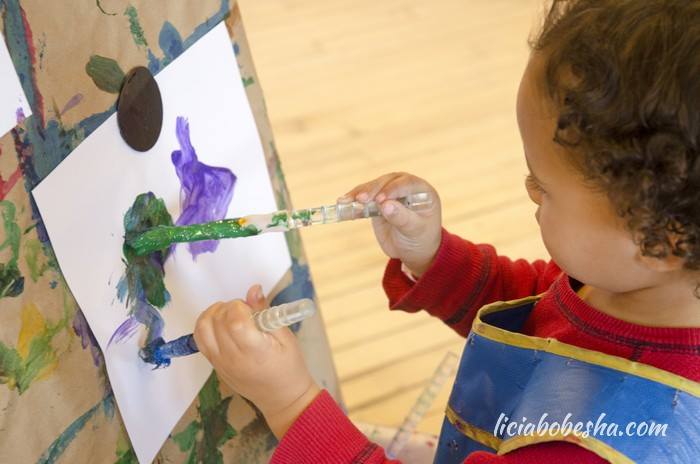
Since the public schools here are failing, I never considered them until some friends toured and liked what they saw. Intrigued, I signed up for my own tour.
The school wasn’t what I expected.
The tour was led by parents of current students. We met teachers, interacted with students, saw the facilities, and asked lots of questions. The teachers seemed kind, compassionate, and knowledgeable. The students were engaged.This school takes Montessori principles and so there’s lots of individual hands-on work.
Had I not known the school was failing, I would have thought it was just fine.
There were computers, playgrounds, gardens, libraries, gym class, music, art, and most importantly I saw happiness at that school. Happiness and pride beamed with the children, the teachers, and the parents giving the tour.
I learned the school is currently in its 4th year as a Montessori, and technically it’s not failing anymore. It’s D-rated with continued improvements.
I had judged the concept, not the reality.
After the tour, I had a hard time reconciling what I saw with its rating. The standard for so long here seems to be that anyone who could opt out of the public school system did, so those remaining were with the lowest resources. Yet during the tour, I saw that with the younger grades they’ve really pulled more of the community in. This was especially apparent with the types of parents I saw touring the school with me.
There was such a disconnect from what I expected it to be like and what I saw. I realized I was thinking in the abstract about “failing schools” and not evaluating the real school in front of me. As this mom brilliantly explains in her essay Why White Parents Won’t Choose Black Schools, school rankings shouldn’t be the only way to assess quality. It’s too often used as an excuse to avoid schools with “too many” black students.
Low test scores don’t mean the teachers are bad.
A letter grade on a school can only tell how students performed on that particular test that particular day. Students from certain homes are always going to do better on those tests. That doesn’t mean the teachers aren’t good.
When many of the students come in without basic letter recognition and when all of the middle class and above abandon the public schools, it leaves them in a near impossible position. We know the word gap. We know how much parental attainment impacts children’s success. We know the effects poverty has on learning. When we automatically opt out of failing schools without ever even visiting, we’re mostly just avoiding low-income children. I know I wouldn’t want to be judged by statistics about my whole race, so I can’t judge a school this way. Moreover, how are these schools ever to improve if the families with the resources to make the biggest difference never try?
Private schools aren’t an easy answer either.
Recently I was talking to some homeschooling parents. Originally, they had enrolled their children in a local parochial school, but their children had quickly advanced beyond the curriculum. Having four kids, they couldn’t rationalize paying money to still have the bulk of their learning going on at home.
From that discussion I saw even private schools here might not meet our needs. The conversation reinforced my desire to try the public school.
It’s only Pre-K, so why not?
I figure Pre-K is a great time to put my school choice where my liberal mouth is. If it doesn’t work out, I can pull him out at any time with few consequences and work on our plan for kindergarten.
Regardless of the school, I will never fully hand over the responsibility to educate my son. As parents, we must be involved at the school with volunteering and helping to see he, his classmates, and his teachers have the resources they need. We must also keep our home a learning environment.
Don’t get me wrong, if he’s ever in a situation that’s damaging his love of learning, we will remove him regardless of whether this happens at an A-rated or a D-rated school.
I do have some real concerns with the school
I worry the schedule is too rigid and the day is too long. I worry there will not be enough time devoted to free play since so many of the students need help academically. I worry that being in a class with students who come in so far behind my son may not receive the attention he needs since he’ll already be performing above grade level. I worry that my son may become bored if the school can’t meet him where he is.
While these worries are valid, I don’t want them to be an excuse to deny my son a potential positive experience. At the tour, my son didn’t want to leave the classrooms. He loved being around the other children. Since he’s so eager to learn, so we’ll fill out the application. While I’d still prefer to send my son to a higher rated school, I’m now open to try other options and help make the existing schools somewhere we’re happy to be.
Would you enroll your child in a low-rated school? What concerns would you have?

